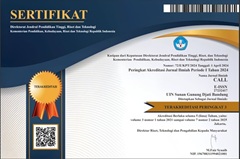THE ROLES OF SOPHIE NEVEU AS REFLECTION OF WOMEN’S EQUALITY IN DAN BROWN’S THE DA VINCI CODE NOVEL
DOI:
https://doi.org/10.15575/call.v1i1.8802Abstract
This research analyzes women‘s issues in The Da Vinci Code novel by Dan Brown.
In the novel there is a female character named Sophie Neveu . Sophie's role as a
woman who can be relied upon in various situations makes her considered as woman
who carries the spirit of feminism. The researchers decided to examine the role of
Sophie Neveu as reflection of women's equality in The Da Vinci Code novel. The
main theory used is Liberal Feminism by Betty Friedan. The form used in this research
is qualitative and descriptive method in process of data analysis. The results of the
discussion of this research are 1). Sophie Neveu play eleven roles of masculine
qualities i.e. strong woman, competitive, courageous, unyielding, confident,
independent, adventurous, aggressive, assertive, intelligent and generally acting as
leaders, and; 2). The factors that make Sophie Neveu able to play this role is the
background of her education. The conclusions of this research are masculine
characteristics that can be owned by women and men, to become advanced
individuals, women as part of the community must have equal opportunities as men
in getting equal education, and the last that education is very important.
Keywords: Characterization, Women‘s issues, Women equality, Liberal feminism,
Masculine qualities
Downloads
Published
Issue
Section
Citation Check
License
Authors who publish in CALL agree to the following terms:
- Authors retain copyright and grant the journal right of first publication with the work simultaneously licensed under Attribution-ShareAlike 4.0 International (CC BY-SA 4.0) License that allows others to share the work with an acknowledgment of the work's authorship and initial publication in this journal.
- Authors are able to enter into separate, additional contractual arrangements for the non-exclusive distribution of the journal's published version of the work (e.g., post it to an institutional repository or publish it in a book), with an acknowledgment of its initial publication in this journal.
- Authors are permitted and encouraged to post their work online (e.g., in institutional repositories or on their website) prior to and during the submission process, as it can lead to productive exchanges, as well as earlier and greater citation of published work (See The Effect of Open Access).




